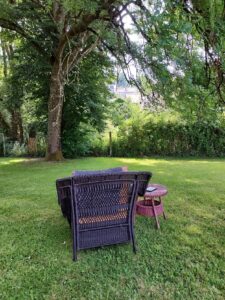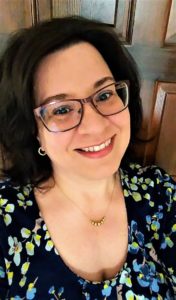 The river shush-shushes through Jane’s backyard as I catch the last of the afternoon breezes under the shade of several trees. It’s tempting to close my eyes, to call this a meditation, but another thought has taken over as I listen to birds calling to one another from the trees on the bank of the river—do birds have accents like humans? Is that why I can’t recognize any of their songs? Rather than closing my eyes, I watch the wind lift and push the leaves above my head and listen more closely.
The river shush-shushes through Jane’s backyard as I catch the last of the afternoon breezes under the shade of several trees. It’s tempting to close my eyes, to call this a meditation, but another thought has taken over as I listen to birds calling to one another from the trees on the bank of the river—do birds have accents like humans? Is that why I can’t recognize any of their songs? Rather than closing my eyes, I watch the wind lift and push the leaves above my head and listen more closely.
By the time this is published, I’ll be returning to Flagstaff after spending five weeks away. For most of that time, I’ve been in the backyard of Jane’s house in Normandy, simply living. As I write this, it’s my last day on this wicker chair under a moss-covered tree; my last day listening to this river. Almost every day that I’ve been here, I’ve thought of that saying, “build a life you don’t need a vacation from,” and, for the most part, I have. But with travel restrictions lifted and Jane’s kind invitation, it seemed like the right time to leave town for a few weeks.
Sensing my restlessness at the end of the academic year, my supervisor asked me several times if he should consider me a flight risk. I laughed and laughed every time he asked me. As the weeks have passed, my laughter has turned from humor to a general sense of discomfort that maybe he knew something I didn’t. Although remaining in France wasn’t my intention early on, I do wonder what I am returning to.
I had just a few plans for this trip: some time in Paris and London with Jane as well as sightseeing in the Normandy region. In addition to traveling around, I’ve been reading most days by this river under the trees. I complete one book after another, a speed-reading habit I picked up in graduate school when I spent six weeks one summer reading almost everything Kierkegaard ever wrote. Although I absorb information, I don’t retain a lot of details. If you ask me for a book recommendation from the past few weeks, my reply might be, “this great book about a woman who runs away to France and the cover is blue and has a photo of the perfect crème brulé…”
Maybe because I’m the woman who wants to run away to France. Although I’ve yet to write the book, I can say I have some chapters mapped out for what may be my greatest auto-fiction to date.
What’s become clear these past five weeks is not that I need a vacation from my life, but from my country of origin. I could use this space to write a litany of everything that’s happened in the United States, but you have lived through it, and I have not. I’ve been away, somewhere else, watching from afar. The most apt thing I can tell you is that Jane and I read the news about Roe vs Wade as we entered the dark Chunnel by train. I looked up from The New York Times headline and out the train’s window into blackness. I could only see my ghostly visage reflected, all the while reminded that I was surrounded by water, under the sea, with no way to escape.
It wasn’t just the train ride or the events covered in the news that made me feel this fear and pressure. There have been so many moments during this trip when I have wondered, “What has happened to the U.S.?” While traveling, I have marveled at the ingenuity of humans. That people in the 400s could build Mont Saint-Michel, and that I could climb its hundreds of still-perfect stone stairs. That the Bayeux Tapestry survived many wars and even uses as a tarp and as an artillery cover before ultimately being rescued (by Nazis!) and displayed as an artifact. That humans can combine eggs and milk and sugar into so many different iterations of deliciousness.
I’m also grateful to people I’ve encountered on this trip for their everyday kindnesses—kindnesses that seem extraordinary because of where I live. In Paris, I met a pharmacist who helped me with my leg and knee issues caused by a long flight and compounded by my overenthusiastic tromping through Paris. He listened thoughtfully and spent over 15 minutes helping me. He found the perfect medication for me and used a measuring tape to fit me for the right size compression socks for my next flight. Another day, a store employee helped my friend Don and I find the right sized windshield wiper blade. He took his measuring tape out to Don’s car so that they could look at the sizing together.
I can’t imagine either of these situations happening in the U.S. After almost every encounter with people here, I find myself asking if we are really living, or merely surviving. With ongoing economic inequities and pressures and laws created and/or eviscerated by ideological minority rule, what kind of lives are we really even able to construct for ourselves? Kierkegaard believed that the freedom he felt in his life was more like a “yawning abyss.” I might argue that it’s not individual freedom that creates the abyss, but rather others who deign to dictate the freedoms we are allowed to have. What I’m returning to is an abyss not of my making. And from which I may never be free again in my lifetime.
Even in this perfect moment by the river, in the shade of this tree, birds singing and breezes blowing, a sense of dread surrounds me, and the deep abyss is now looming in my periphery. There are just a few days of light before I’m engulfed again. The question that remains morphs into something more universal—how do we build a country that we don’t need a vacation from? And how do we crawl out of this widening abyss?

